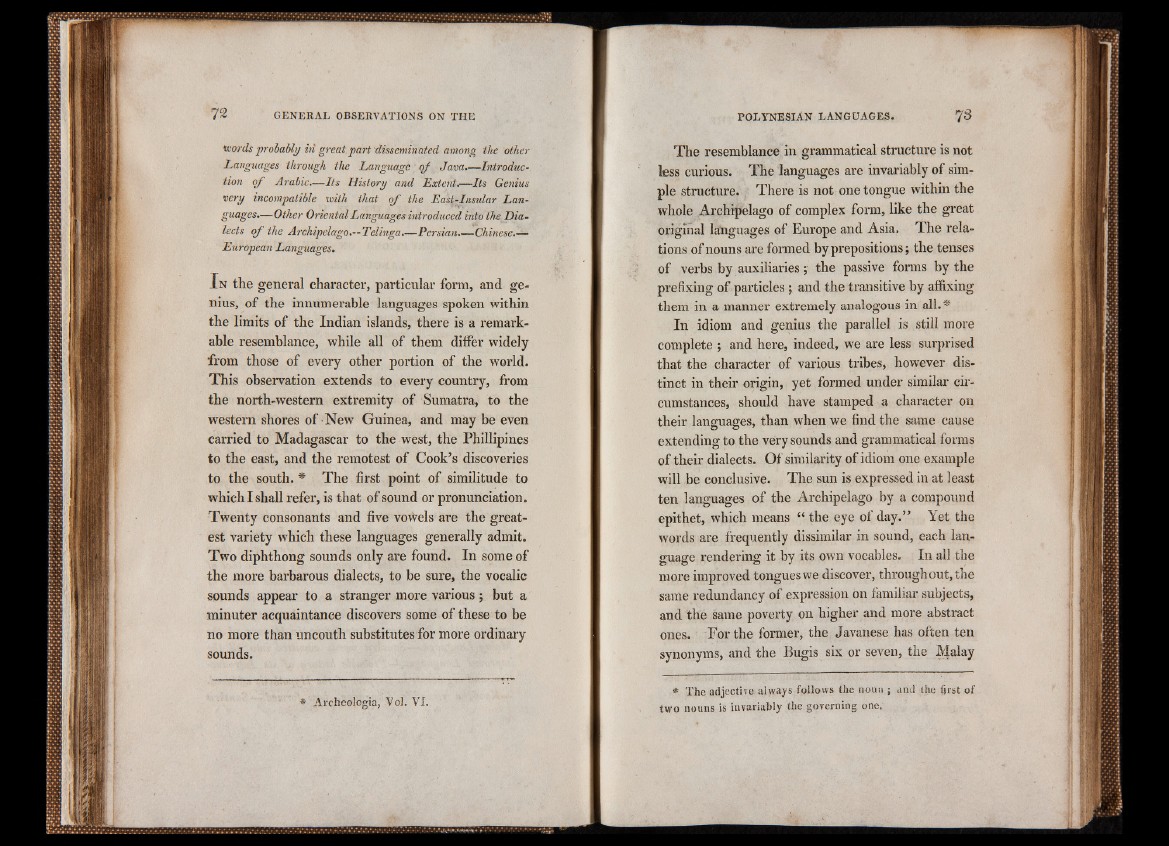
'words probably in great part'disseminated among the other
Languages through the Language oj Java.—Introduction
of Arabic.—Its History and Extent.—Its Genius
very incompatible with that of the East-Insular Languages.—
Other Oriental Languages introduced into the Dialects
o f the Archipelago.— Telinga.—Persian.— Chinese.—
European Languages.
I n the general character, particular form, and genius,
of the innumerable languages spoken within
the limits of the Indian islands, there is a remarkable
resemblance, while all of them differ widely
from those of every other portion of the world.
This observation extends to every country, from
the north-western extremity of Sumatra, to the
western shores of New Guinea, and may be even
carried to Madagascar to the west, the Phillipines
to the east, and the remotest of Cook’s discoveries
to the south. * The first point of similitude to
which I shall refer, is that of sound or pronunciation.
Twenty consonants and five voxels are the greatest
variety which these languages generally admit.
Two diphthong sounds only are found. In some of
the more barbarous dialects, to be sure, the vocalic
sounds appear to a stranger more various; but a
minuter acquaintance discovers some of these to be
no more than uncouth substitutes for more ordinary
sounds.
* Archeologia, Vol. VI.
The resemblance in grammatical structure is not
less curious. The languages are invariably of simple
structure. There is not one tongue within the
whole Archipelago of complex form, like the great
original languages of Europe and Asia. The relations
of nouns are formed by prepositions ; the tenses
of verbs by auxiliaries ; the passive forms by the
prefixing of particles ; and the transitive by affixing
them in a manner extremely analogous in all. *
In idiom and genius the parallel is still more
complete ; and here, indeed, we are less surprised
that the character of various tribes, however distinct
in their origin, yet formed under similar circumstances,
should have stamped a character on
their languages, than when we find the same cause
extending to the very sounds and grammatical forms
of their dialects. Of similarity of idiom one example
will be conclusive. The sun is expressed in at least
ten languages of the Archipelago by a compound
epithet, which means “ the eye of day.” Yet the
words are frequently dissimilar in sound, each language
rendering it by its own vocables. In all the
more improved tongues we discover, throughout, the
same redundancy of expression on familiar subjects,
and the same poverty on higher and more abstract
ones. For the former, the Javanese has often ten
synonyms, and the Bugis six or seven, the Malay
* T he adjective always follow s the noun ; and the first of
tw o nouns is invariably the governing one.